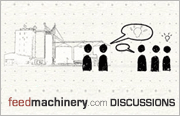
The Thai Feed Mill Association chairman, Pornsin Patcharintrakul, has said that the association has agreed in principle to help in the protection and preservation of the marine ecological system through the introduction of lucrative pricing for fishermen who follow good fishing practices.
The Thai Feed Mill Association's move was in response to criticism that the Thai feed industry was the main culprit of buying trash fish (small young fish that fishermen cannot sell), to make fish meal. This in turn encouraged the fishermen to use illegal nets, with smaller mesh, in order to trap trash fish which would have grown into larger economic fish. This practice is said to be detrimentally destroying marine populations.
Mr Patcharintrakul admitted that sooner or later Thai based feed milling companies will be directly and indirectly forced to comply with the environment friendly trend of protecting and preserving a sustainable marine ecological system.
European countries have already said they will support only legal fisheries. All marine products shipped to the European Union must be verified to ensure they were harvested using legal legal fishing methods approved under the Global Good Agricultural Practices or other similar international certifications.
“Our members will use pricing to lure fishermen as the law alone cannot make it happen. Trawlers with a certificate proving their legal fishing methods will get better prices than others which have no documentation,” he said, adding that trawlers using illegal fishing equipment will be forced out of the system.
Sa-nguansak Akarawarinchai, chairman of the Thai Fishmeal Producers Association, explained that 65% of fish meal is made from unwanted fish parts from the food industry and only 35% is from trash fish. The country produces 500,000 tonnes of fish meal a year and uses 352,000 tonnes of trash fish a year.
He said it is not the job of fish meal producers to find out whether trash fish is caught using legal or illegal equipment. It is the job of the state agencies to take action under the fishery law.
Oxfam yesterday released its research of “Mapping Shrimp Feed Supply Chain in Songkhla Province to Facilitate Feed Dialogue”, which studied the impact of the fish meal industry on fishing communities and marine environment.
Sarinee Achacanuntakul, lead researcher, said that the study was carried out in Songkhla province, which is home of the largest fish meal producers in the South with a production capacity of 39,402 tonnes a year. It discovered that the industry has had a major impact on the marine ecological system as well as on local fishing communities.
The study found that the income of local fishermen dropped 40-fold between 1983 and 1999 based on findings in the five fishing villages in the province.
“Some fish meal producers' actions decrease marine fertility. Poor-quality trash fish is still sold to the plants, which doesn’t help fishermen realise the importance of legal fishing nets,” she said.
Trawler fisherman usually use finely meshed nets to catch fish, including trash fish. Young fish are unable to pass through the mesh of the nets and are caught and eventually sent to fish meal plants, leading to falling numbers of marine fish.
According to the fishery department, fisherman used to catch 297.8 kilogrammes of fish an hour in 1961 but this decreased to just 17.8kg an hour in 2000.







